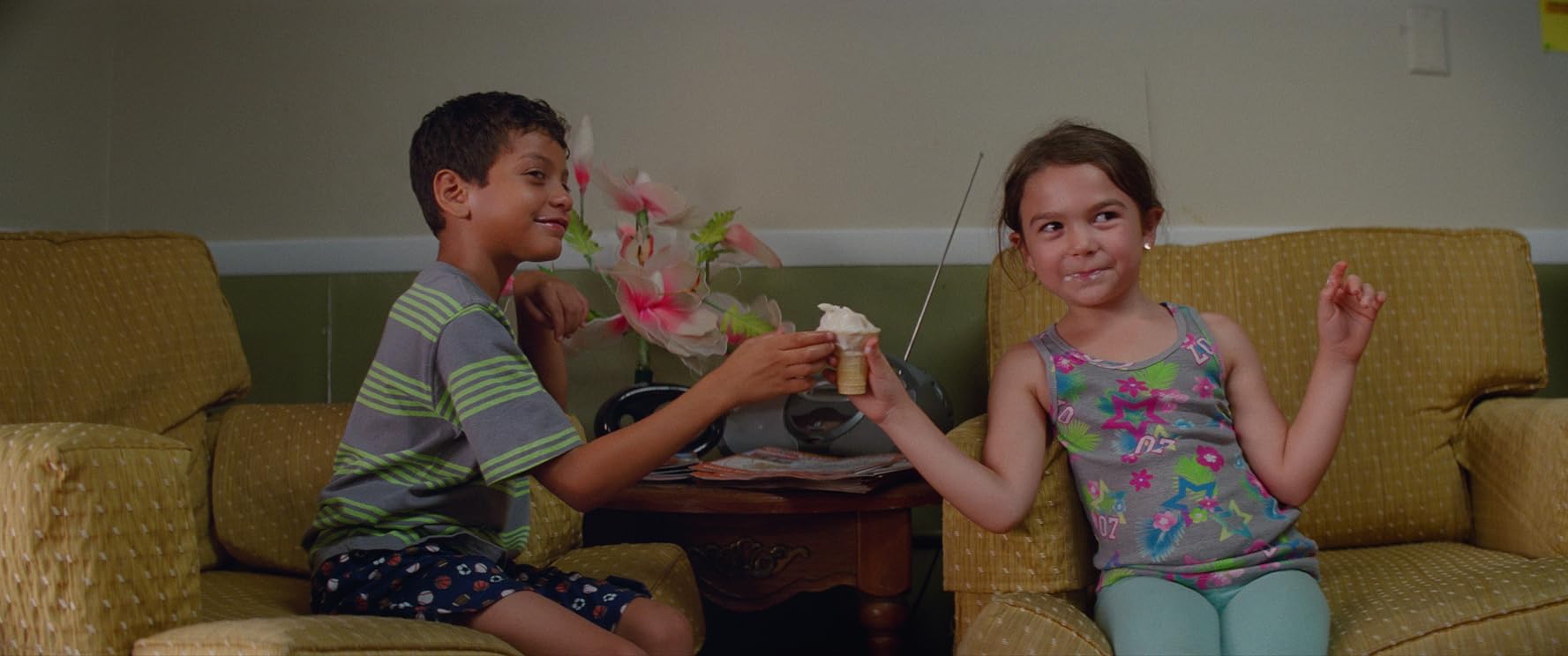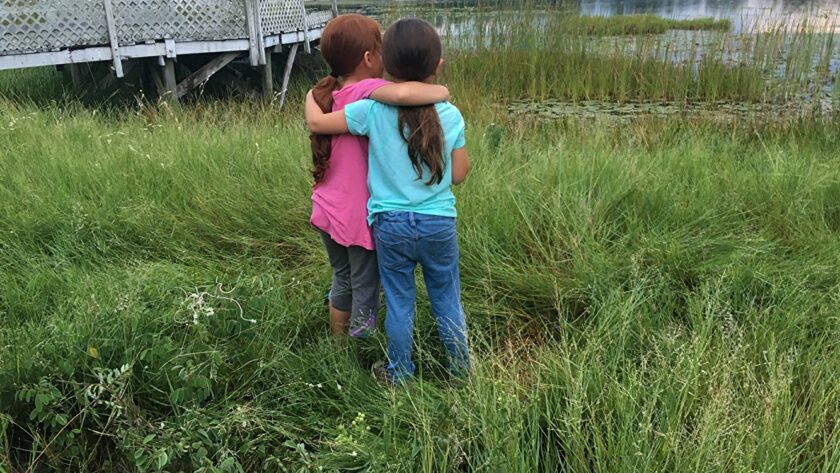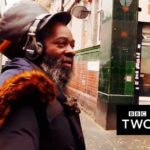A few of our writers butt heads over Sean Baker’s stylistic choices.
WARNING: CONTAINS SPOILERS.
The Florida Project, released in late 2017, has been critically acclaimed and deemed a top awards season contender. The humanistic story, beautifully shot, follows Moonee (Brooklynn Prince), a rambunctious child living in a motel room near Disneyland, Florida, with her irresponsible but loving young mother. Her living situation slowly becomes more precarious in the background of her childhood antics as her mother struggles to pay rent. Real life eventually gets the better of Moonee’s la-la-land: in the final sequence, she realises the sweet-talking grown-ups who’ve appeared at their motel room door – Child Protection Services – are going to take her away from her mommy. Panicked, Moonee breaks away and runs to her best friend Jancey (Valeria Cotto)’s room. She breaks down crying when Jancey opens the door. In act of solidarity, mischief, and friendship, Jancey takes Moonee’s hand, and suddenly the atmosphere changes. The music becomes upbeat and playful; the camera goes jittery and POV-style. The girls run together to Disneyland, the fantasy destination whose proximity colours and seduces Baker’s eccentric, pastel paradise.
To some, the switched-up style of The Florida Project‘s conclusion is jarring and unwelcome. Others see it as a coping mechanism: a creative descent into Moonee’s imaginative, childhood world. The facts are that Baker shot the Disneyland scenes secretly without permission, and on an iPhone 6S Plus. Addressing the ending of his film, Baker said, “We’ve been watching Moonee use her imagination and wonderment throughout the entire film to make the best of the situation she’s in … In the end, with this inevitable drama, this is me saying to the audience, ‘If you want a happy ending, you’re gonna have to go to that headspace of a kid because, here, that’s the only way to achieve it.'”

Not a fan?
LIAM’S THOUGHTS
Throughout ‘The Florida Project’, the spectre of Disney World looms in the distance, a behemoth both culturally and spatially which drips colour onto peripheral and far less glamorous motels like the Magic Castle. Home to Moonee and her mother Halley (Bria Vinaite), this location transforms into a makeshift Magic Kingdom through the perspective of a child’s eyes, the hopeful but limited world-view protecting Moonee from the tribulations of life below the poverty line, but leaving her vulnerable as well. It is in this moment of vulnerability, as her entire life crumbles in the film’s conclusion, that she breaks through the lines of disappointing reality and discovers the fantasy Disney World signifies. However, pervading this border seems to undermine the subtle commentary of the piece, that despite being so close to the Magic Kingdom it will always be inaccessible, an understated tragedy that is far more powerful and relevant. In addition, the jarring technical shift from film to digital that accompanies this finale, necessitated by the fact that Baker did not have permission to film on the resort, is rough and clunky, as opposed to the beautiful delicacy which the director imbues the rest of the movie with. Akin to the proverbial dream sequence, a stylistic change makes some sense, but a great deal of elegance would b3 required to really pull it off. With that being said, I really like ‘The Florida Project’ and the ending by no means ruins the experience, only prevents what is really good from becoming great.
SAM’S THOUGHTS
The Florida Project is a beautiful movie, a powerful reflection on hardship, childhood, and friendship. In its closing moments Moonee, our protagonist, cries outside the home of her only real remaining friend in the world – a friendship we have watched form and blossom over the last hundred minutes. In an achingly brilliant and uncomfortable closeup, we watch her own construction of reality shatter, and the truth of her situation sink in.
Cut to black. Walk home. Think about the movie for the next month.
This is how I wish The Florida Project had ended. However Sean Baker – somewhat admirably – wanted to drive home the film’s core concept, on how children escape their problematic situations, one final time. To do so, he shoots a lurid, dreamy sequence obviously representing a fantasy, but that is in keeping with the style of the rest of the film. Moonee and friend run away from their problems to Disneyland. It strengthens the main themes and improves the movie as a whole.

In an alternative reality, this is also a wonderful ending to The Florida Project. However Sean Baker and A24 couldn’t get clearance to shoot at Disneyland. As a filmmaker dedicated to perfection and excellent visual storytelling, Baker concedes that his proposed ending is impossible to execute properly, and returns to his original ending.
In another dimension, this is the creative process for indie-purist Sean Baker. However Sean is pontifical and unyielding, determined to execute his vision. So he grabs an iPhone and an easily sourced, $200 gimbal, shoots a sequence with the same careful cinematography the rest of the movie has, sneaks into Disneyland, and sits happy knowing the movie is everything he wanted it to be.
Yet still, this is not how it went. Instead we got an unstabilised, poorly shot, cinematically incoherent scene that pulls everyone watching out of the emotional catharsis Baker had expertly put them in, to instead wonder what on Earth he was thinking.
Baker is without a doubt a wonderful filmmaker. The Florida Project is without a doubt a genuinely great movie. But the ending of The Florida Project is symptomatic of a director with too much vision for his own good, and holds the film back from the praise it deserves.

All for it
XIN’S THOUGHTS
The ending scene definitely came out of the left field – its bizarre tonal change managed to pull my emotions with an emergency brake from immersion and sympathy to utter confusion of disjointed thoughts. I didn’t know how to feel about it for at least a few weeks.
That was the point, isn’t it? It puts us in an uncomfortable position, left with such an ambiguous ending that would understandably be unsatisfying to some, blocking the audience from knowing the reality of Moonee’s fate. But it doesn’t matter. Baker asks the audience to come to their own bleak conclusion, giving us the power to choose what is best for her. Would it be better for her if she ran away? Lived with Jancey? Or if she was taken by social services and separated from her mother? Baker forces us to make the decision instead, and for us to suffer the moral consequences of our choice. How else should Baker end it?
Not only so, it’s a testament to the friendship Moonee has built with Jancey, and an insight to the character’s own desperation. Despite all her toughness, she’s nonetheless a child – she just wants to go to Disneyland, live in an actual magic kingdom with her friend, play in a place with no danger and no limits. A symbolic icon of innocent happiness and magical childhood dreams, the Magic Kingdom we know finally lights up the screen in a blur, fulfilling Moonee’s fantasy and providing her sanctuary and optimistic hope. A haven to run to.
Yet because of her background, because of the life she was born into, Disneyland can only be a fantasy, nothing more. And that’s a heart-breaking point to end on for a film dealing with childhood, poverty, and the harsh reality.

CALVIN’S THOUGHTS
GEORGE’S THOUGHTS
“A filmmaker who prefers ideas to images will never advance above the second rank because he is fighting the nature of his art. The printed word is ideal for ideas; film is made for images, and images are best when they are free to evoke many associations and are not linked to narrowly defined purposes.” So said Roger Ebert on the criticism towards the great champion of images over ideas, Federico Fellini. I use it now as I anticipate the criticism of the ending of Sean Baker’s truly beautiful “The Florida Project”.
Let me make myself clear – I am not going to argue that the film’s ending is necessarily a great one. I believe the film is probably a great one, but I think the ending is so divisive that it cannot simply be great. People who are derisive of the film claim it is “poverty porn” in that it entices people into the allure of the bottom of society and glamorises it. People who loved it say it’s a magnificent blend of gritty social realism and lurid dreamscapes. However, whatever you think of all but the last minute of the film, the ending seems to stand separately. It is so distinct from the rest of the film that even some of the film’s supporters, like friends I went to see the film with, were alienated by the ending. This is largely due to its complete shift in style, mood, cinematography and music. The film has a flowing lackadaisical quality that serves in the manner of an ethnographic film. Thus when the viewer is confronted with the inevitable, an ending for this film, they have to decide whether they like what the filmmaker is saying or not. Whatever Sean Baker’s ending, it would have been divisive, because the whole film seems to play out without a real acknowledgement of closure, but paradoxically builds up a climax that requires one.

So the film was always going to have a problematic ending (or at least a divisive one). But what Sean Baker does is surely the best possible answer. The film’s protagonist Moonee, having realised she will be taken away from her mother, runs to find her friend Jancey, and flees the motel to Disney World, in a frenzied child escapism. He switches the film’s absolutely stunning cinematography from 35mm film to an iPhone 6s Plus to create the shot (he previously filmed “Tangerine” entirely on an iPhone 5s). The smooth and crisp cinematography shifts to jarring and fuzzy, and the audience definitely feels jarred. It feels rushed, it feels disconcerting, it feels uneven and incongruous with the rest of the film.
And it works. Because in a film so focused on the close-ups of daily life, of human beings, that tries to blend ethnography into narrative storytelling, how could a filmmaker be so obnoxious as to give the viewer a great dramatic closure? My friends said they expected something else from the film, something more – but how could a film that tries to be so true to human life and struggle say something that no one can claim to know? There is no possible greater closure to a story where a child of a prostitute is torn from her mother and sent into foster care. What truly mature film can give this story a happy ending, or sad one? But to leave the viewer with merely an image, conjuring so many different ideas, interpretations and answers – that is the mark of a film which has respect for its subject matter. We aren’t left with a clear idea of what happens to Moonee, or whether she has a terrible life or a great one. We are merely given an image of what it is like to be a child, still able to run as fast you can to escape whatever you want and be comforted, if only for an instant.
The Florida Project was out for wide UK release in November, 2017. Watch the trailer below and read our full review from London Film Festival earlier in October.





Hey, bozo. It’s Disney WORLD, not Disneyland.
Did you watch the movie?
Is there going to be a part 2? I hated the ending!
It wasn’t The California Project you idiots. Florida. FLORIDA. Do you have any clue why it was called “The Florida Project”?
I just farted